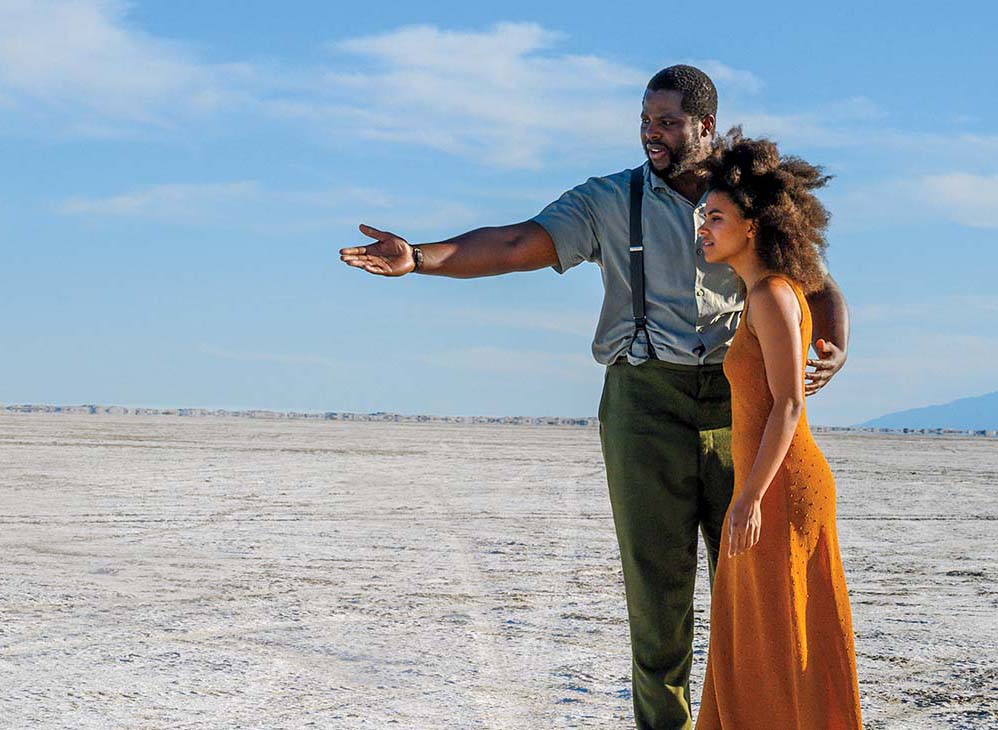Nine Days, written and directed by Edson Oda, takes place in a primordial purgatory where unborn souls spend nine days competing for a chance at life. Will (Winston Duke) serves as a judge for this competition, putting candidates through trials that test their capacity for human existence before choosing one person to send to Earth. Those who Will chooses, he also monitors: their lives play out in VHS-quality point-of-view shots on a wall of old TVs. Will uses the footage to keep extensive notes and to test his current batch of competitors, who are expected to give their honest opinions about what they see—or else lose the competition and vanish, never to be born.
READ ALSO: Jordan Peele does a lot right with ‘Us’
It’s a great premise, and rife with potential. But the film’s approach to it is oddly flavorless. A more conceptually shrewd filmmaker like Kaufman or Jonze couldn’t go without noticing the perverse implications here: a handful of nascent souls with full, visual access to our most private moments? Introducing oneself to the messiness of human experience via non-consensual leering can’t be good for anyone’s mind, souls or otherwise. But the souls of Nine Days—who, by all appearances, are essentially full-grown humans—treat it like another day at the office. So does the film. When Will and his charges witness traumatic violence, they discuss it with the gravity of a morning defecation—and they discuss watching a stranger defecate as if it were water cooler conversation.
The souls seem to be functioning on the emotional, intellectual, and social levels of adults, but their dialogue and performances omit the nuance with which adults would grasp these situations. Will shows them a clip of a deadly shootout—”what would you do?” Kill or be killed, says Kane (Bill Skarsgård), the pragmatic soul with a pessimistic outlook. I don’t know what I’d do, says Emma (Zazie Beetz), the kindhearted soul who’d probably spend her time on Earth running a baby bird rescue. Nine Days reduces the vast, perplexing network of human morality into a series of trolley problems. Do you stand by and let the trolley run over five people tied to the tracks, or divert it to a different track, killing only one person? The film thinks it’s getting mileage out of posing such questions, but it’s merely nodding its head in agreement with the notion that life is complicated. Existentialist Jean-Paul Sartre—who championed a philosophy that centers the lived, human experience—dismissed this type of problem as a confluence of hypotheticals, preferring to focus on the headspace of the person posing the question. What does their anxiety over the ethical quandary say about what it means to be human? That’s what Nine Days misses. Even when the souls don’t have answers for Will, we don’t see them really wrestle with the problem. It’s all concept, no humanity.
Will’s personal struggle is the closest Nine Days gets to realizing what its concept grasps at. He’s in shock that Amanda, one of his previous picks for life on Earth, died in a car crash right when things were coming up roses. Something about her unfulfilled potential strikes a chord with Will, who was once alive himself, and he ponders the injustice of life given to someone who couldn’t handle it. Will’s arc evinces a determination to dispel the myth of a “wasted life”, but the goodwill therein is diminished by Emma’s thankless part in it. She’s a quirky, selfless, sympathetic soul—not like other female souls, you see—who’s ultimately more concerned with Will’s emotional fruition than the looming threat of nonexistence. For a movie that purports to explore the fullness of humanity, the presence of a Manic Pixie Purgatory Girl is more than hypocritical.
Nine Days’ biggest mystery is why it chose the medium of film, rather than something like a black box play. The production design is minimalistic, occasionally bordering on drab. There are a couple great scenes where Will constructs DIY earthly experiences for the souls who didn’t make the cut, but beyond that, the film looks routine and static. Even the snippets of life playing out on Will’s TVs fail to enthrall. These POV scenes are no more than clichés: a teenager bullied in the school hall, a Malick-y hand brushing against foliage. Seeing them with our own eyes is less descriptive than words could be. Nine Days could’ve been a short story without losing much of its identity. As a movie? It’s more than underwhelming.
★ (1/5)




